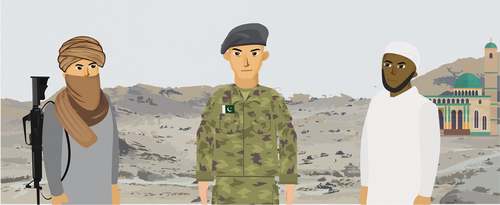NOTWITHSTANDING CPEC-related development in Balochistan, insurgent groups remain active in the province. Over the years, security forces have largely contained the violence, but it is nevertheless an issue of concern in a challenging regional environment. Speaking at an event in Gwadar on Monday, Prime Minister Imran Khan voiced an intention to hold talks with “disgruntled extremists who are offering resistance in Balochistan”.
If he is indeed considering this approach, its success depends greatly on an honest and objective appraisal — within all relevant institutions — of where the state has gone wrong in its policies towards the province. After all, there must be cogent reasons why so many insurgencies have arisen in Balochistan since independence. But does there exist a capacity for such introspection? There is no doubt of course that hostile foreign elements have played, and continue to play, a role in exacerbating the conflict but they are dabbling in troubled waters. History has shown how genuine grievances left unaddressed can become a fertile ground for inimical forces to exploit.
Read: Religion, nationalism and insurgency in Balochistan
The last time that holding talks with the ‘angry Baloch’ was pursued in earnest was when the National Party leader Dr Abdul Malik was chief minister of Balochistan. He had reached out to the separatist leaders in exile, and may have even met some of them on a visit to London. Dr Malik’s efforts, however, were doomed to fail in an environment where the execrable ‘kill and dump’ policy towards any Baloch suspected of separatist leanings was still being applied — especially given that he had in his electoral campaign vowed to bring the practice to an end. It left no doubt as to who was actually in charge of the policy towards the province. The chasm of mistrust between the disaffected Baloch and the state has only grown wider with every facile promise, every sham election and every ‘development package’ that never delivered what it claimed to. And the stories of the missing Baloch add to the sense of historical injustice.
Any serious attempt at reaching out to the insurgents needs to have the consensus of the civilian government as well as the security establishment, and it must be based on a willingness to make concessions. The state must loosen its control over Balochistan’s resources, profits from which must be ploughed back into the province to an extent and in a manner that meets the requirements of justice. Given the trust deficit, it would make sense to involve nationalist leaders — such as Dr Malik and BNP-M’s Akhtar Mengal — who may still have the ear of the ‘angry Baloch’, in the effort to ‘woo’ them. Some observers believe the time for building bridges has long gone, but it is also a fact that many Baloch yearn for peace and feel caught between the separatists and the state. That is a desire worth tapping into.
Published in Dawn, July 7th, 2021













































